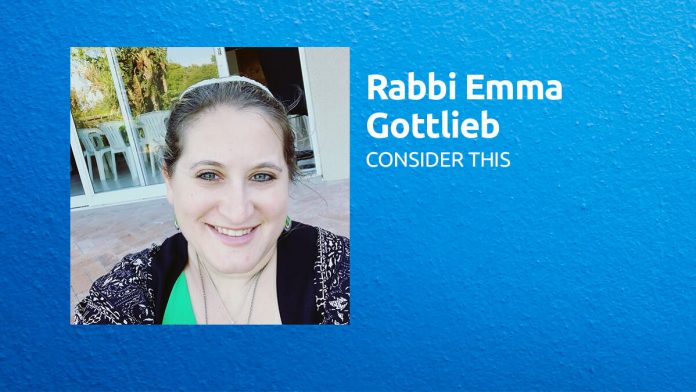By Rabbi Emma Gottlieb
A few weeks ago, as we read again from the beginning of the Torah, I found myself noticing something in a new way (this is why we read the Torah anew each year!).
In the narrative of Adam and Chavah, I found myself drawn to the word ervah, in the verse that states (3:7), “And the eyes of them both were opened, and they knew that they were ervah; so they sewed fig-leaves together, and girded themselves.” Most English versions of Torah translate ervah, as ‘naked’. The humans saw they were naked, and rushed to cover themselves. The more I thought about it, the more unfortunate this translation seemed. The rush to cover up their nudity implies shame — certainly all Judeo-Christian religions at some point have taught (or still do) that nakedness is shameful; that bodies are inherently sexual; that we are responsible to cover ourselves up to help ensure that others can control their focus and their sexual urges. How many thousands of years of shame have we carried because of this translation? How many humans have been harmed by these ideas over the ages?
And then I wondered, what if, instead of ‘naked’, we had been given the translation of ‘vulnerable’ (i.e. then their eyes were opened, they saw how they were vulnerable, and rushed to make protective clothing)? After all, when Adam and Chavah eat from the Tree of Knowledge of Good and Evil, they become aware, first and foremost, of their mortality, and of their human agency — their ability to make choices with inherent consequences. Both ideas carry a sense of vulnerability. The awareness that we cannot change the fact of our mortality, and that we may err and suffer the consequences of our actions, or — even worse — the consequences of another’s actions, leaves us vulnerable. Awareness of our own humanity comes with awareness of our limitations. Adam and Chavah’s eyes are opened to this knowledge and so they rush to try to cover themselves protectively — not because they are ashamed, but because they are suddenly aware of all the dangers around them (the burning sun, the cold night, poisonous plants, stinging insects, etc).
Rabbi David Wolpe, also looking for an alternate translation, brings forward the idea from Midrash that the humans realise that they are ‘naked of mitzvot’ — seeing that without guidance, they will not know how to properly conduct themselves in this new reality where they are suddenly aware of their own free-will. Wolpe explains how we often try to cover ourselves with possessions, titles, connections and refinements to help us feel safe. “We fear being naked, not in the physical sense, but in the metaphysical sense… But the Midrash insists that to be naked is not to be stripped of possessions, or attachments; it is to be stripped of good deeds. One who is cloaked by righteousness is not naked… To be without goodness is to be truly exposed, with mitzvot one need not feel unprotected or afraid.”
Whether we lean in to the traditional explanation of ervah, or look to other understandings, the same underlying ideas are there — the humans feel exposed, not because there is anything wrong with being unclothed — not because there is any-thing shameful about their naked bodies — but because the world is full of dangers, of temptations, and of that which we cannot control. When we use our creative abilities to make that which can protect us (which is one of the ways that we understand the concept of being created betzelem Elohim, in God’s image — having a measure of God’s creative abilities), and when we turn to Torah to guide us in making good choices — we find that we are far less vulnerable, less exposed, less naked. We can move forward with confidence, in faith, on the path that God has revealed. We won’t avoid danger — we won’t evade mortality — but perhaps we will spend less time feeling ashamed of ourselves and our limitations. If we feel proud of how we use our creative energy and proud of how we conduct ourselves — we will have far less to fear when we are called to return to the Garden.
Temple Israel www.templeisrael.co.za
• Published in the December 2022/January 2023 Digital Edition – Click here to read it.
• To advertise in the Cape Jewish Chronicle and on this website – kindly contact Lynette Roodt on 021 464 6736 or email advertising@ctjc.co.za. For more information and advertising rate card click here.
• Sign up for our newsletter and never miss another issue.
• Please support the Cape Jewish Chronicle with a voluntary Subscription for 2022. For payment info click here.
• Visit our Portal to the Jewish Community to see a list of all the Jewish organisations in Cape Town with links to their websites.
Follow the Cape Jewish Chronicle: Facebook | Instagram | Twitter | LinkedIn











